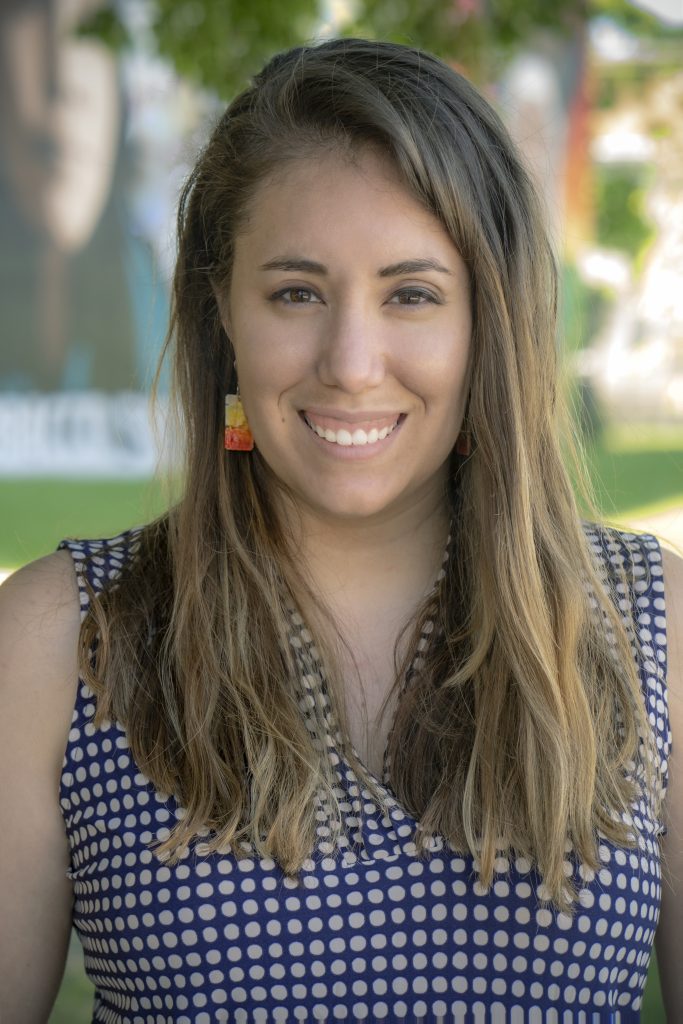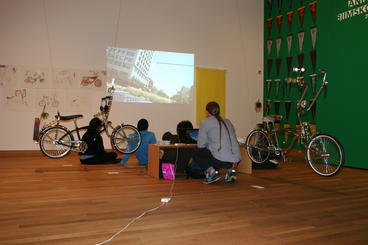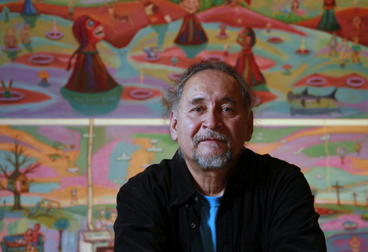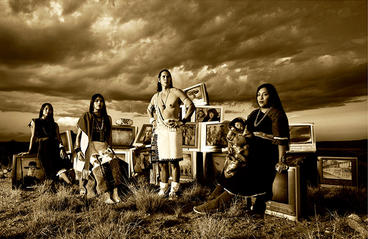My name is Alex Buffalohead. I am an artist, curator, and musician in a family band with my parents, called Bluedog. For my day job, I am the Arts and Cultural Engagement Manager at the Native American Community Development Institute and All My Relations Arts gallery in the American Indian Cultural Corridor on Franklin Avenue in Minneapolis.
Since the stay-at-home order, I have been trying to stay creative, even while confined to the apartment with my partner and two cats. We’ve been listening to and playing music, and cooking and eating delicious food. I am a keyboard player mainly, but have been waiting to get a power cord mailed to me to replace one I lost. So, I recently picked up my dusty, neglected guitar. I’d forgotten how challenging it is; I have been experimenting with Fender’s three-month trial app on how to play the bass. (I recommend it for others who are looking to pick up an instrument—ukulele, guitar, whatever calls to you.)
It has been great seeing other artists share on social media, with live performances, like the Wake Singers (based in Rapid City, SD). The Wake Singers have been sharing new original music lately. Michael Two Bulls (Oglala Lakota) is one of the founders of the band. He is the drummer, and sometimes plays guitar. Reed Two Bulls (Oglala Lakota) is the lead singer, and also a visual artist; he is the youngest of the group. The Two Bulls family, in general, is known for leading an “Indigenous art renaissance.” (Another of their cousins Molina Jo (Two Bulls) Parker has been featured in Vogue for her jewelry.)
I have also been following artist Maggie Thompson (Fond du Lac Ojibwe), of Twin cities-based Makwa Studio, who held a design challenge contest encouraging people to color patterns for a hat she would weave. Maggie is known as a textile artist who has exhibited at All My Relations Arts Gallery, Mia, and the Plains Art Museum. She has started this incredible project called the “ribbon mask project” where for every masks she sells she will be donating two masks to partner organizations in her community.
I feel really fortunate to be able to check in with other creatives in the course of my daytime job. I’m also staying in touch with my curatorial fellows and mentors from the Emerging Curators Institute (ECI), the Cedar Cultural Center’s artist collective, and the Weisman’s tour guide training group. Our ECI cohort still meets monthly, and it has been helpful hearing ways other people are coping, what methods of self-care they are exploring, in addition to sharing resources about different grant opportunities. Community-building is especially important during these emotionally and, for some, financially difficult times. I feel like checking in with other creatives like the Cedar, ECI, and Weisman tour group has helped me normalize my feelings of uncertainty, by hearing that others are struggling to adjust to this newer way of distancing from another and ways they are practicing self-care.
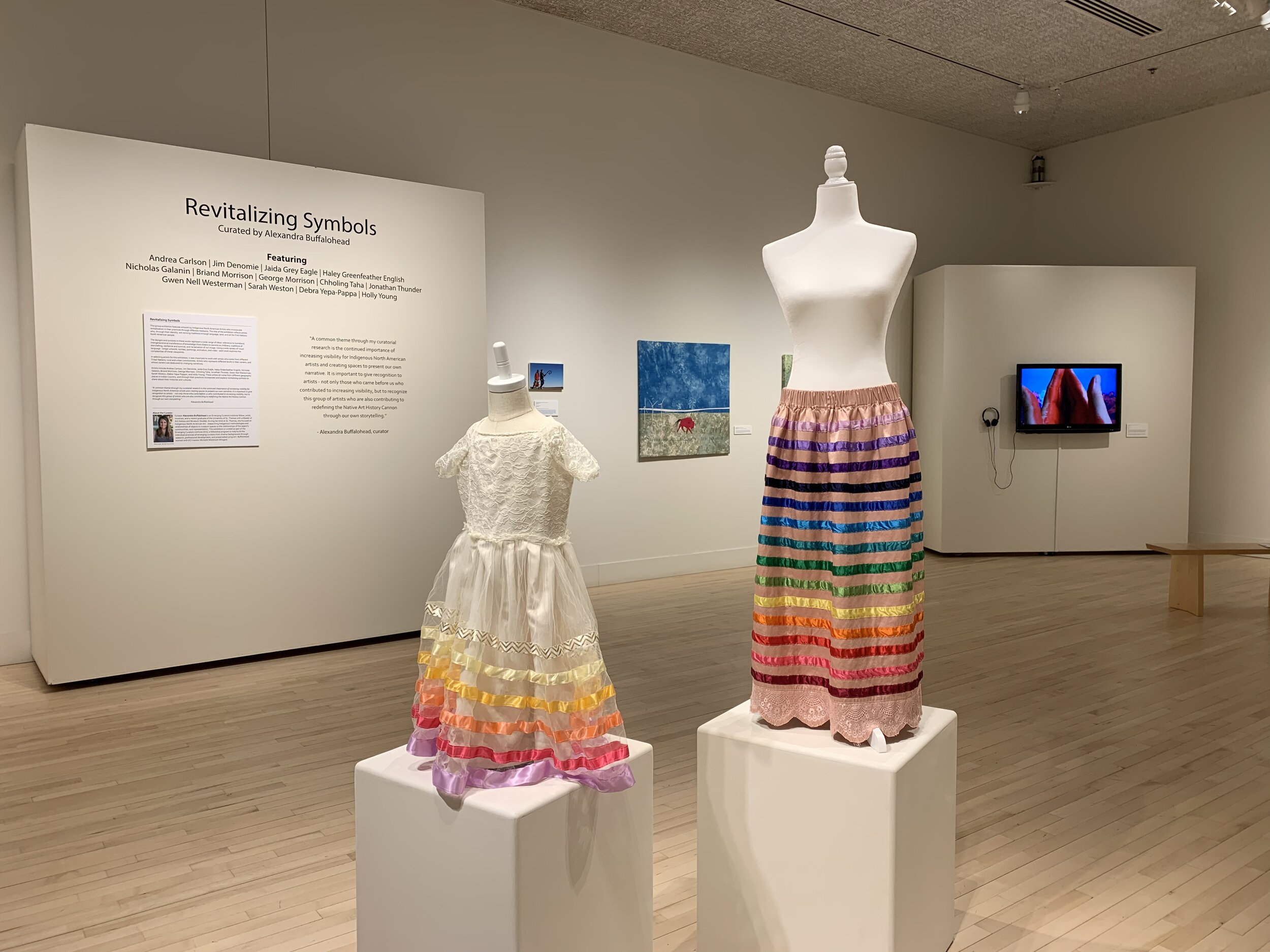
With the pandemic, it has been taking me a while to adjust to this different way of life. Being able to go for walks has been a blessing, as well as taking time to cook things at home and connect with friends and family by phone. I'm learning how to slow down, and how to appreciate the feeling of having more time in the day.
Lately, I have been sharing funny, positive, and inspirational things with friends and family. This is one way I have been able to help care for others in a remote way. It is important to support artists and local businesses in our community in whatever ways we are able to, either financially or by re-sharing their content. The artists and comedians in my social media circles have been a helpful source of inspiration. I would recommend checking out IAIA Museum of Contemporary Native Arts (MoCNA)’s new virtual reality exhibition tour of their most current exhibition Indigenous Futurisms: Transcending Past/Present/Future, because of the importance of exhibitions that present work from a First Nations perspective, and emphasizes the importance of Futurism in Native cultures. In addition, the artists who participate in this show are legends to me. For example, Debra Yepa-Pappan’s (Korean and Jemez Pueblo) work was one of the first pieces I saw when I was introduced to the concept of Indigenous Futurism in my Native North American Art classes taught by Dr. Jill Ahlberg Yohe.
One other fun thing I have read and enjoyed seeing is this digital catalogue, called Indelible Ink: Native Women, Printmaking, Collaboration by the University of New Mexico Art Museum. Some of my all-time favorite and influential artists’ prints are included and the artists share the inspirations for their works. This catalogue is just one of several ways in which Native women artists are finally getting long overdue recognition.
Alexandra Buffalohead is the Arts and Cultural Engagement Manager at the Native American Community Development Institute and All My Relations Arts Gallery in Minneapolis, MN. Buffalohead is a 2019 Emerging Curator Institute Fellow and has curated exhibitions at Highpoint Center for Printmaking in Minneapolis, and Artistry’s Inez Greenberg Gallery in Bloomington. Buffalohead earned a BA from Augsburg University, an AS from the Art Institute International of Minnesota, and an MA from the University of Saint Thomas.
This dispatch is part of the spring 2020 Conversations with Creatives series,
made possible by Student Services Fees and created with WAM Collective.
Read more personal responses from artists and creatives coping with COVID-19 >>
